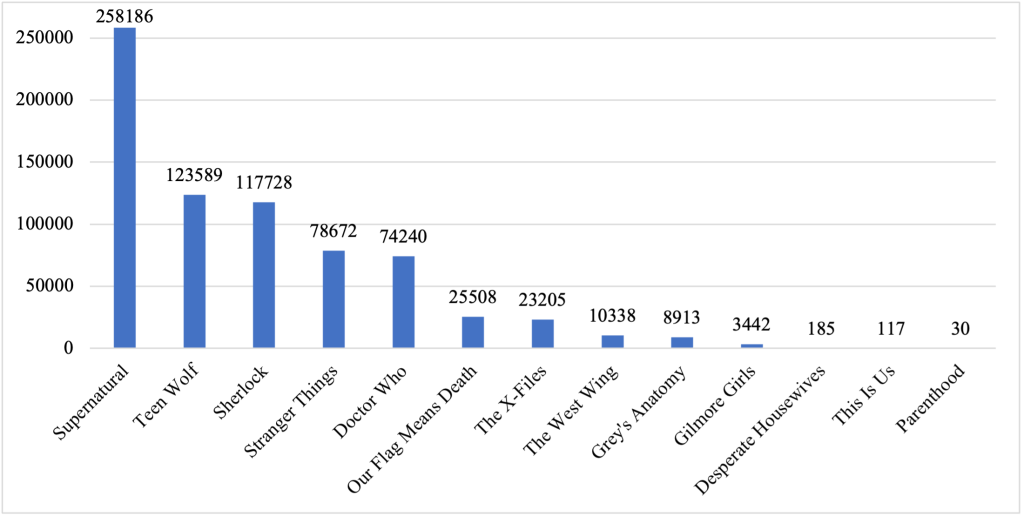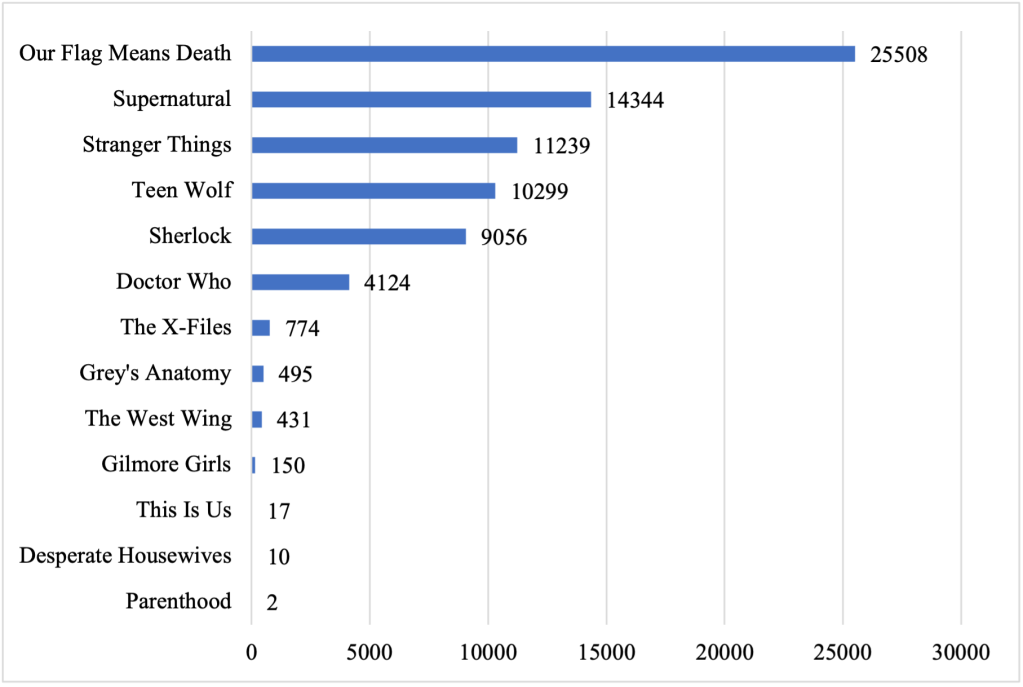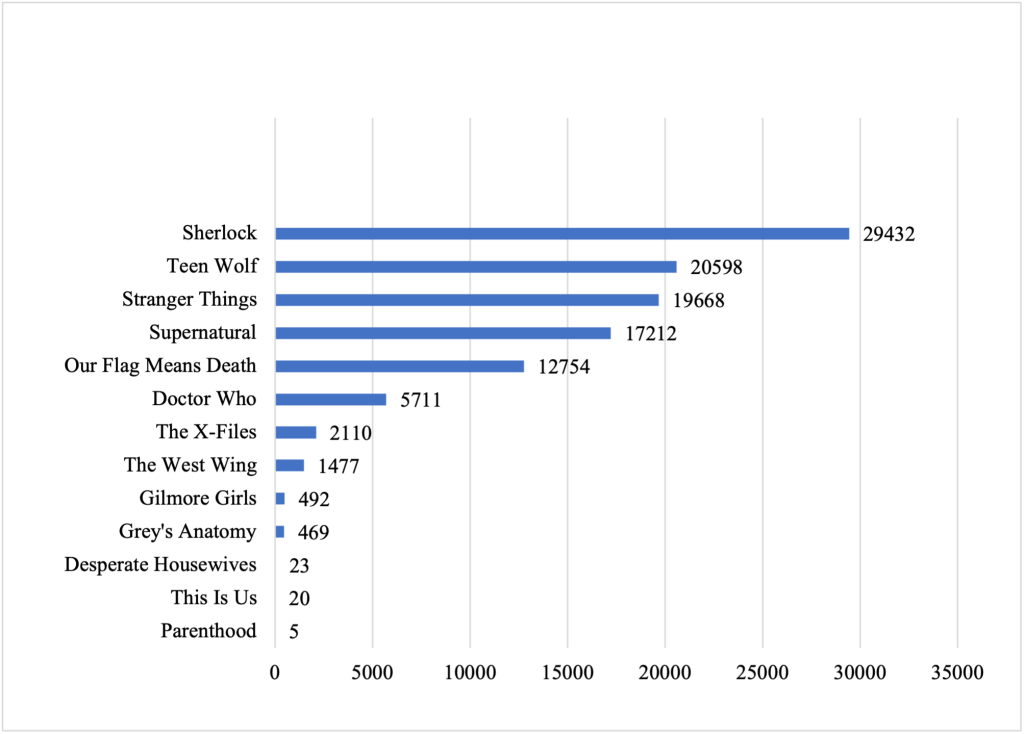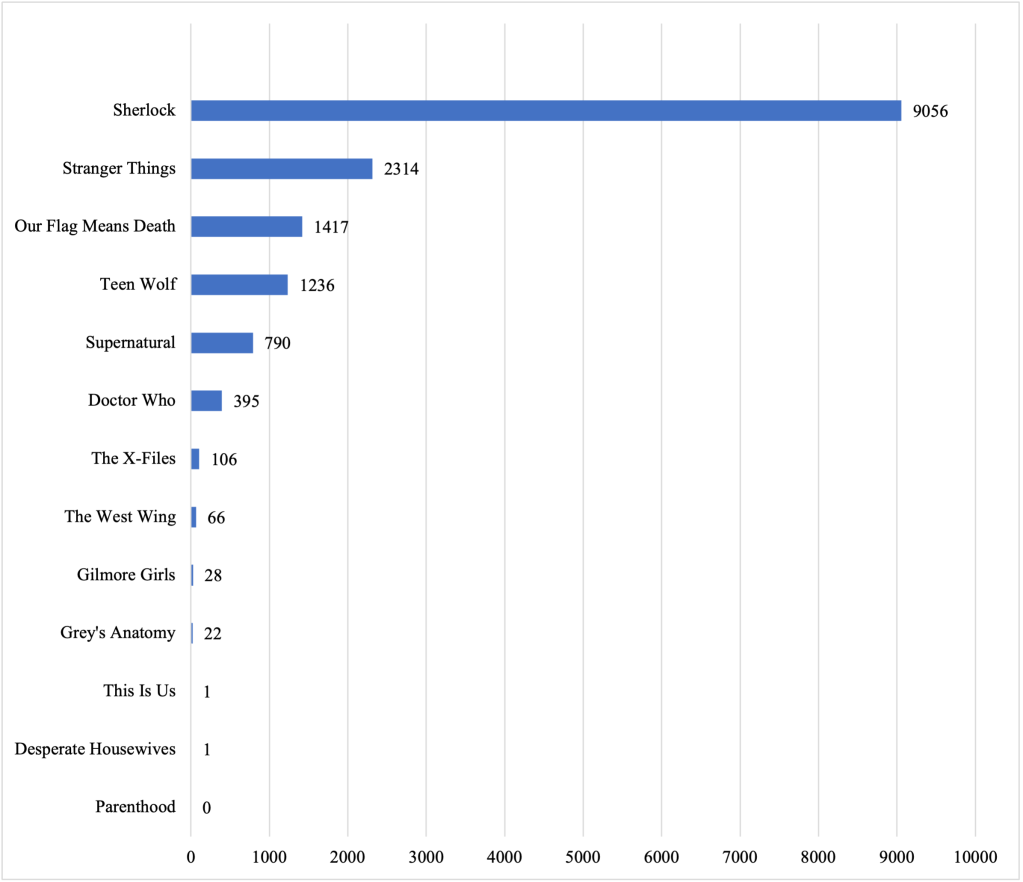By Julia Neugarten
When I am feeling down, I watch an episode of Gilmore Girls, an early-2000’s dramedy about a mother, her teenage daughter, and their romantic entanglements in the idyllic town of Stars Hollow. Now, before you point out all the ways that Gilmore Girls has aged poorly – and yes, it has classist and fatphobic undertones and the way it portrays Korean Americans leaves much to be desired – I want to note that the show is also optimistic, kind-hearted, clever, funny, and female-centric. In short, Gilmore Girls is (almost) everything I look for in a feel-good show.
Here’s something else I tend to do when I’m feeling low: I read fanfiction – or fic – on Archive of Our Own, one of the largest English-language fanfiction websites. Because of the way the archive is structured, I can look for stories that either allow me to wallow in my self-pity (which we call angst in fanfiction-jargon) or stories that pick me up and fill me with warm fuzzy feelings (which we call fluff). Natalia Samutina described fanfiction as “emotional landscapes of reading,” because it lets readers curate their emotional trajectory this way.1 My own recent research also shows that some responses to fanfiction praise stories for their capacity to bring about specific emotions, especially comfort.
I am satisfied with my coping strategies. I’m sure everyone feels sad from time to time, but a Gilmore Girls + fanfic double whammy never fails to cheer me up, which is why I find it strange that very little fanfiction has been written about Gilmore Girls. And since I am a data-driven scholar of fanfiction, I decided to quantify this matter: which TV shows generate a lot of fanfiction? Which generate almost none? What could explain the difference in fanfiction production between these shows?
Here are some TV shows I randomly hand-picked, visualized with the number of fanfics written about them on Archive of Our Own as counted at the start of 2024.2
How many stories?

If you’re familiar with TV fandom, the numbers I found probably don’t surprise you. After all, some of these shows have had much more time to accrue a committed fanbase than others, and some also have many more episodes. So, let’s divide the number of stories written about each show by the number of years that have passed since it first aired; that’s the amount of time they’ve had to accrue fanfiction.
Fanfiction Production Over Time, Seasons, and Episodes

Our Flag Means Death comes out as the clear winner here. Since its inception in 2022, this show has had a very active and vocal fanbase. But Our Flag Means. Death has only had two seasons; what is the effect of that?

In this comparison, the clear winner is Sherlock, which has a meager four seasons. Sherlock generated an impressive 29.000 works of fanfiction per season, almost 30% more than the runner up, Teen Wolf, which averages a little more than 20.000 stories per season over six seasons.3 When looking at the average number of stories produced per episode, Sherlock also comes out as the clear winner with more than 9.000. Runner-up Stranger Things has a little over 2.000. This could be due to Sherlock’s unusual format, which consisted of very few episodes per season, all of which were movie-length.

We can conclude that Sherlock fandom has been unusually industrious. But Sherlock isn’t the reason I decided to run these numbers; Gilmore Girls is. In all these comparisons, Parenthood, Desperate Housewives, This Is Us, Grey’s Anatomy and Gilmore Girls are consistently the lowest scorers. These shows have inspired fewest fics overall, fewest works per episode, per season, and per year. Why? What do these shows have in common?
Introducing Ficcability
To explain this phenomenon, I propose the concept of ficcability: the extent to which a particular tv show or other narrative invites, inspires, and encourages the production of fanfiction. This concept builds on Henry Jenkins’ idea of drillability.4
“the ability for a person to explore, in-depth, a deep well of narrative extensions when they stumble upon a fiction that truly captures their attention.”
Jenkins’ notion of drillability calls attention to the fact that not all stories are equally open to interventions and extensions from the audience, and that formal features of the story, such as the perceived depth and extensibility of the narrative, can either invite or discourage rewriting and transformation.
The Unficcable: Emotions-Only Shows
So, what makes a story ficcable? In her 2008 analysis of fan discourse around the TV show Roswell, Louisa Ellen Stein found that fans distinguished between two types of shows, which they called Emotions-Only and Special People-shows.5 As explained by a fan:
“Special People programs focus on talented individuals who face conflict from without, whereas Emotions-Only programs feature ‘normal’ characters whose conflicts come from within themselves and from their relationships with each other.”
And what do all shows that inspired relatively little fanfiction – Parenthood, Desperate Housewives, This Is Us, Grey’s Anatomy and Gilmore Girls – have in common? That’s right; they are Emotions-Only shows. These shows are about families, colleagues, neighbors, and lovers, about the (mis)communications that structure our social world, our desire to be recognized and understood, to share, to connect, to belong. They are comfort shows, in the sense that their emphasis on emotional trajectories can be comforting to watch. These shows help us navigate our feelings and desires by showing us characters who struggle to negotiate social situations we may recognize from our own lives. Additionally, these shows tend to emphasize emotional fulfillment and happy endings for their characters, essentially closing off the narrative. This focus makes narratives such as Gilmore Girls emotionally satisfying. I hypothesize that this makes fanfiction less necessary to give audiences the emotional and narrative closure they seek.
The Ficcable: Special People Shows
By contrast, shows that inspire a lot of fanfiction – Supernatural, Sherlock, Teen Wolf, and Stranger Things – are Special People programs. Their protagonists are monster hunters, genius detectives, werewolves or members of a select group who have access to another world. These shows emphasize action over feeling, plot over person, exterior action over interior character development. These are shows where the narrative tension and structure comes from dramatic encounters with monsters, villains, and crimes, where personal and emotional responses to these dramas are sidelined to make room for action and excitement. Supernatural rarely lingers on the emotional strain of hunting monsters. Later seasons of Sherlock turned attention to the relationship between Sherlock and John, but complicated murder mysteries always remained more central to the plot than feelings. Because of their emphasis on plot, these shows leave an emotional gap that fanfiction communities are then inspired to fill.
Storyworld: An Additional Aspect of Ficcability
Ficcability is also impacted by the construction of a storyworld. In shows structured around monsters and mysteries, the plot is endlessly extensible. In the world of a show like the X-Files or Supernatural, there is always a new monster to fight, a new mystery to solve. As a result, these storyworlds capture the imagination, inviting fanfiction communities to come up with their own fantastical creatures and improbable situations. These adventurous worlds might invite more fanfiction than the ostensibly realistic storyworld – small-town America – of a show like Gilmore Girls.
So ficcability is a property of a TV show that relates both to the imaginative potential of its storyworld and to the show’s position on an axis that goes from emotion-oriented to action-oriented.
Problematizing Ficcability
A closer look at Our Flag Means Death (OFMD), the clear winner in the Fics/Year-category, problematizes the concept of ficcability. OFMD is a show about pirates. It’s heavy on the action and its storyworld is full of adventure. At the same time, interpersonal relationships are central to the show, and the comedy largely comes from the clash between adventure-oriented characters and storylines and the strain these fast-paced plots put on interpersonal relationships.
In one of the funniest moments of the show’s second season, a group of enemy pirates decides not to torture and kill the protagonists. Instead, the enemies mutiny, because they no longer feel that their captain is providing them with an emotionally nurturing work environment. That’s right. An emotionally nurturing work environment. On a pirate ship.
In this scene, OFMD explicitly stages the incompatibility of fictional characters’ emotional fulfillment and their adventurous lifestyles and storyworld. Perhaps it is the show’s acknowledgement of their characters’ emotional needs – in the face of their adrenaline-fueled adventures – that makes it so incredibly ficcable, and perhaps Our Flag Means Death is exploring possibilities for a different kind of TV show – and associated fandom – that combines the ficcable with the emotionally resonant.
This aligns with the observation, taken from Stein’s case study, that some fans praise TV shows’ ability to transcend strict genre categorizations. I hope to see many more transgeneric shows on TV in the future, because they seem eminently ficcable to me!
Many thanks to Fenna Geelhoed for giving feedback on an earlier draft of this blogpost.
Footnotes
- Samutina, Natalia. “Emotional Landscapes of Reading: Fan Fiction in the Context of Contemporary Reading Practices.” International Journal of Cultural Studies, vol. 20, no. 3, 2017, pp. 253–69, https://doi.org/10.1177/1367877916628238. ↩︎
- I am sure other fanfiction platforms, such as Fanfiction.net or Wattpad, have very different distributions over fandoms. ↩︎
- This comparison does not account for the fact that fanfiction production is unlikely to be stable over time. ↩︎
- Jenkins, Henry. “Transmedia Education: The 7 Principles Revisited.” Pop Junctions, 21 June 2010, http://henryjenkins.org/blog/2010/06/transmedia_education_the_7_pri.html. ↩︎
- Stein, Louisa Ellen. “‘Emotions-Only’ versus ‘Special People’: Genre in Fan Discourse.” Transformative Works and Cultures, vol. 1, Sept. 2008. URL: https://doi.org/10.3983/twc.2008.043. ↩︎

